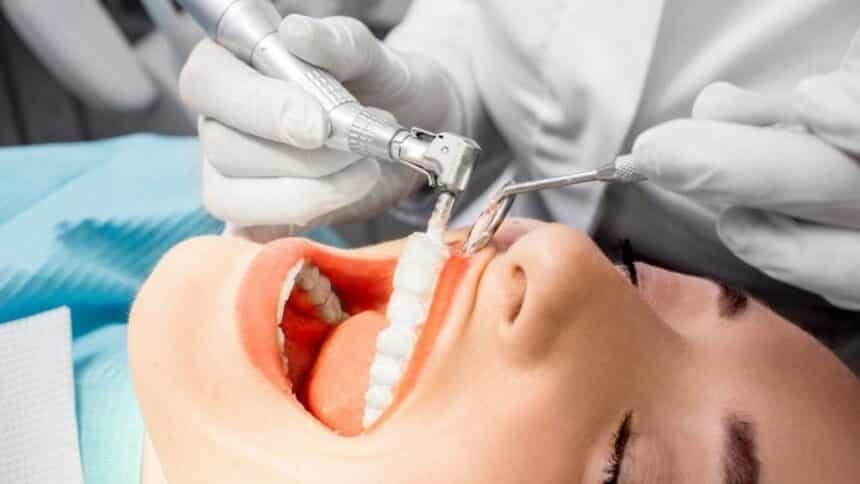The accumulation of tartar causes, among other things, tooth sensitivity, bleeding gums and exposed tooth necks. This eventually leads to periodontitis, which if left untreated can end in tooth loss. This is why regular dental hygiene in the UK is so important. And what exactly does tooth sandblasting, scaling, polishing and fluoridation consist of?
However, let us start at the beginning.
Tartar - what is it and where does it come from?
There are many causes of tartar formation. These include genetic predisposition, smoking, poor diet or malocclusion. However, the most significant cause is poor oral hygiene, i.e. irregular or inappropriate brushing, not flossing and not visiting the dentist regularly. Dental hygiene in the UK at least twice a year can effectively get rid of tartar.
And what exactly is he?
This is mineralised plaque that has formed due to the accumulation of food debris and bacteria and has not been removed by brushing. Tartar is the dark rim at the edge of the gums.
Important! If not removed, it also accumulates under the gum linecausing them to bleed, exposing the necks of the teeth and ultimately causing periodontitis. This disease, if left untreated, can end up with teeth falling out.
You can read more about this in our article "Modern periodontitis treatment in the UK with Vector Paro Pro„.
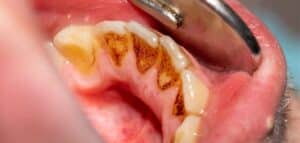
Dental hygiene in the UK - a way to get rid of tartar and have a whiter smile
Dental hygienization is several procedures aimed at removing tartar and cleaning the teeth of surface deposits and bacterial plaque. Full hygienization consists of scaling, tooth sandblasting, polishing and fluoridation. What do these treatments consist of?
Scaling
This is the removal of tartar that has accumulated on the teeth, in the interdental spaces and around the gums, both in the front and back of the teeth. In addition to traditional scaling, there is also what is known as deep - subgingival scaling. This is a method for removing subgingival tartar.
Scalikng is a painless procedure and tartar is removed mechanically or using ultrasound equipment. There is also laser and chemical scaling.
Tooth sandblasting
This is the removal of plaque and stains. For this purpose, a special device is used which feeds a jet of water along with tiny particles of dental sand. Preventing possible questions - tooth sandblasting does not damage the enamel. The main purpose of sandblasting is to improve the aesthetics of the smile, remove bacteria, as well as plaque resulting from drinking coffee or smoking.
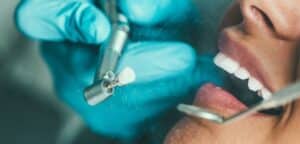
DID YOU KNOW! The above two treatments not only affect your oral health, but also the colour of your teeth. They are often whiter after they are done. How is this possible? Dark and unsightly tooth colour is the result of discolouration and dark tartar.
And what else affects the colour of your teeth? You can find out in our article "Tooth discolouration and the factors that affect it„.
Teeth polishing
This is nothing more than smoothing the surface of the teeth using specialised pastes. It is an indispensable part of dental hygiene, which reduces the build-up of tartar and plaque. In addition, it provides a pleasant feeling of smoothness to the teeth.
Fluoridation
This is the last of the dental hygiene treatments. Its main purpose is to strengthen the enamel and increase resistance to caries. To this end, a fluoride-containing agent is applied to the surface of the teeth.
Not all four treatments are always performed. Dental hygiene in the UK depends on the needs of the individual patient. Therefore, it is best Call us and make an appointment at our practice.
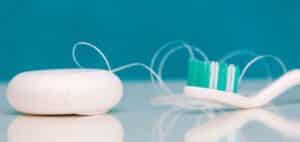
Dental hygiene in the UK is not enough
Even visiting the dental surgery twice a year may not be enough. In addition to regular hygiene, you need to remember to proper daily oral hygiene. Both the toothpaste, toothbrush and brushing technique should be adapted to your age and the condition of your teeth. You must also not forget to floss your teeth, which is unfortunately often overlooked.
How to choose the right toothpaste, how to brush and floss properly - this is what you will learn during your first dental hygiene session in our office. You will then receive a full oral hygiene instruction.
Importantly, you should not eat or drink for a minimum of one hour after having your teeth hygienized. There may also be tooth sensitivity, which will subside over time.
Remember also that teeth need to be cared for at any age and preferably from a young age. Therefore, it is best to make an appointment for your little one at our office as soon as possible. We also recommend you our article "Preventive treatments for your child - or how to keep your little one's teeth healthy„.
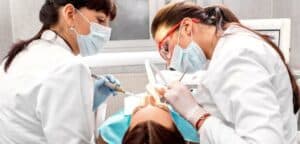
Dental hygiene in the UK - how often and for how much?
How often dental hygiene should be performed depends on the individual patient's needs. However, the bare minimum is to visit the dentist's office every six months.
The cost of a full dental hygiene treatment at our practice is £160. As we wrote earlier, not all treatments are always necessary.
If dental hygiene in the UK is only part of a larger treatment planIf it costs more than £350, you can pay in instalments. Importantly, the first 12 months are zero interest, meaning you only pay back the amount you have spent. Our instalment scheme is secure and regulated by Financial Conduct Authority (FCA number 619628). And if you want to find out more about this topic we recommend our article "Teeth on credit: dental treatment on hire purchase", and if you have any further questions Call us.
Finally, we have one more piece of information - if you have previously been treated by a Polish dentist or another practice in the UK and have received a dental treatment plan, you can apply to us. Based on this, we will provide you with our cost estimate.
More than once, we have had situations where our patients not only gained a healthy smile, but also spent less money on dental treatment and, in addition, were able to pay in instalments. If you would like to find out more about what a dental treatment plan is and what is included in it - please see the article "Dental treatment plan, the costing of your teeth".

